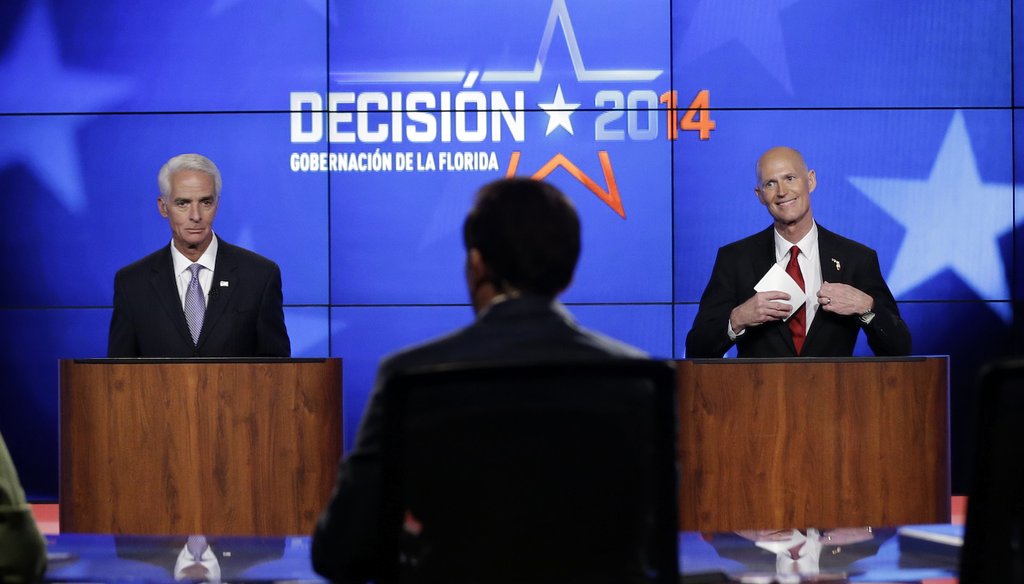Stand up for the facts!
Our only agenda is to publish the truth so you can be an informed participant in democracy.
We need your help.
I would like to contribute

Charlie Crist and Rick Scott appear together in their first debate, on Oct. 10, 2014, at Telemundo studios in Miramar. (AP photo)
Rick Scott and Charlie Crist faced off in their first debate of the governor’s race, hammering themes that they thought would appeal to Telemundo’s Hispanic audience and repeating many of their favorite lines from the campaign trail.
Scott, the incumbent Republican, spoke of family and hard work. Crist, the former governor who switched parties and is now a Democrat, spoke of raising the minimum wage and expanding health care access.
PolitiFact Florida attended the debate at Telemundo’s studios in Miramar at 11 a.m. on Friday, Oct. 10; the debate was translated into Spanish and aired at 7 p.m. that night.
Here we’ll fact-check some of the key claims Crist and Scott made during the debate and point you to fact-checks from our archives on similar topics.
On jobs
Scott noted about a half-dozen times during the debate that 832,000 people joined the ranks of the unemployed in Florida while Crist was in office.
The number is about right, but blaming Crist for it is questionable. Florida’s job losses during those years depended heavily on the national and international economic picture, not because of Crist’s particular policies. The statement is partially accurate but leaves out important details, so we rated it Half True.
Crist defended his job performance during the recession, particularly his acceptance of federal stimulus funds. If Florida had not taken the stimulus, it "would have led to the firing of 20,000 teachers," Crist said.
That figure is close to estimates from the state Department of Education. However, it’s difficult to pinpoint the exact number of teachers who would have been laid off statewide, since districts would have had discretion in how to handle budget cutting and may have had other options to reduce spending beyond laying off teachers. We rated Crist’s statement Mostly True.
Scott said that 3,000 teachers lost their jobs while Crist was governor, repeating a dubious claim we rated from a TV ad put out earlier by Scott’s political committee, Let’s Get to Work.
The number comes from media reports about possible layoffs, not actual layoffs. And Crist was not solely responsible for the budget cuts to education that happened on his watch. Both Crist and the Republican-led Legislature signed off on cuts amid a national recession. Finally, Crist accepted federal stimulus money that ended up preserving thousands of teacher jobs. Overall, we rated the claim Mostly False.
On raising the minimum wage
Scott said raising the minimum wage could cost Florida jobs.
"I want more jobs. And that’s why I ran on 7 steps to 700,000 jobs. The CBO says that if we raise the minimum wage the way Charlie wants to do it, it would lose 500,000 jobs," Scott said. "I don’t want to lose those jobs."
Scott is referencing the nonpartisan Congressional Budget Office’s estimate for the effect of President Barack Obama’s plan to lift the federal minimum wage to $10.10 an hour. A loss of 500,000 jobs is the agency’s best guess, though it could be lower or higher.
More importantly, though, the CBO's analysis pertained to the country as a whole. Scott's comments came in a discussion about Florida jobs, which means the number is being taken out of context. We rated Scott’s statement Half True.
On education
Crist said that Scott cut $1.3 billion out of Florida schools during his first year as governor. There are various ways to add up the total cuts in K-12, but Crist is generally on the right track here. Crist uses the $1.3 billion figure that includes the cut in state and state-required local dollars, but the largest chunk was due to the expiration of stimulus funds. It’s important to note that much of K-12 education funding was restored, though it’s still below pre-recession levels. We rated a similar claim from Crist Mostly True.
Scott attacked Crist on college tuition increases at Florida schools, saying, he "passed legislation that allowed tuition to go up 15 percent year after year after year." Scott is partly right; tuition did go up 15 percent in 2009 and 2010. But tuition increased only 5 and 6 percent the two years prior. So Scott added one year too many. Also, Crist wasn’t the only actor here; the Legislature approved increases, as did the state Board of Governors. Still, tuition did go up each year, and as high as 15 percent for two years. We rated a TV ad with a similar claim Mostly True.
Finally, Scott and Republicans often repeat that state funding for K-12 education is at its highest funding ever, and Scott repeated it at the debate. In sheer dollar amounts, there’s some basis for the claim, but it ignores inflation as well as how many students are in the system. Crist still holds the per-pupil record for education, but that was prior to the recession. We rated a similar claim from a TV ad Half True.
Our Sources
See individual fact-checks for complete sources.































